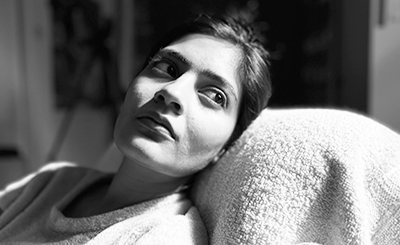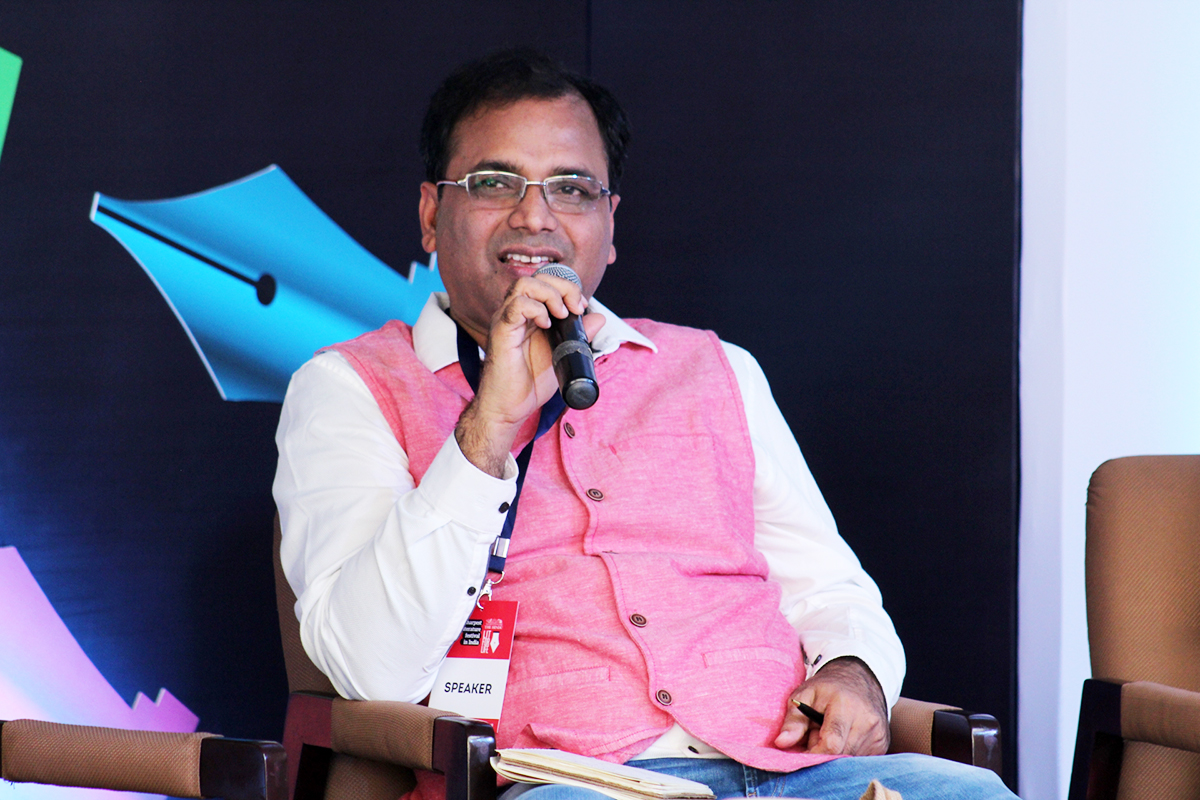
Abdullah Khan. Photo courtesy of the author
As Indian-American author Chitra Banerjee Divakaruni once said, everyone has a story; I don't believe anyone can go through life without encountering at least one amazing thing. Abdullah Khan, too, had a story. And he converted it into a bestselling novel. Khan’s novel, Patna Blues (Juggernaut), was among the most talked about debuts of 2018, warranting a reprint within six months, and garnering translation rights for a number of Indian languages (Hindi and Urdu translations are almost ready.) In this interview, the Mumbai-based banker-turned author discusses his new life as a writer.
You worked on Patna Blues for a long time, and it had a hard road to publication. Now that the book is out, are you able to let go and move onto your next project?
I have been with Arif and Sumitra (the protagonists of Patna Blues) for almost two decades; it’s difficult to let them go. But, yes, I am trying to do so and have already started working on my second novel.
You mentioned that Orwell also inspired you to be novelist…
Born in a village near Motihari, Bihar, I was initially educated in a madrassa and an Urdu-medium school. I was around seven or eight when my father brought me a storybook. The stories in that book fascinated me so much that I thought of becoming a writer. But, then, I forgot it in the course of time. In early 1990s, I came to know that George Orwell was born in Motihari and that made me wonder if I could be a writer like him. My writing style or the themes of my novel, however, are totally different from those of Orwell.
It is interesting that Patna Blues, a small-town story about a lower middle class protagonist, has found acceptance among the English-speaking readers. If you look at post-liberalisation Indian English fiction, it’s almost always about the upper class English-speaking protagonists…
Majority of the Indian writers writing in English come either from big cities or are NRIs. So, their worldviews are different from those from small towns. And, it’s also quite natural that they will write about a character with whom they can relate to. But, writers like Aravind Adiga, Siddhartha Chowdhury, and Hansda Sowvendra Shekhar have protagonists with humble backgrounds in their novels.
While reviewing Patna Blues in major publications, most reviewers foregrounded the “Muslim’ aspect of the story (understandably, given the current political climate). While Arif’s religion is part of his identity, do you think looking at the story through the lens of Muslim identity robs the story of its innate humanity?
Everyone has his/her own way of looking at a story. But, for me, Patna Blues is three stories in one. One is simply the story of a boy, Arif, the central character, who deals with love, lust and ambitions, as he goes through the painful process of growing up. The second is Arif’s story as well, but it’s also the story of a Muslim boy in particular, and this flows into a larger narrative of being a Muslim in post-Babri India, with its own challenges and anxieties. The third is the story of India itself, not the India that exists in the cities, but the India of villages and small towns, which are generally ignored by the mainstream media.
Yes, if we look at any story through the lens of any particular identity, then we are doing grave injustice to the story and its author. But, luckily, the readers have not looked at my novel in that way. I have feedback from the readers from all over the world and most of them were able to identify with the protagonist, Arif, notwithstanding their different ethnic, linguistic, national and religious identities.
A few reviewers complained that the Patna you describe in your novel is not “their Patna”. How would you respond to that? What’s “your Patna” and how important is it for you as a novelist?
This is my version of Patna, the Patna I experienced while growing up. Obviously, it will not match with the Patna of someone who comes from different social or religious background. For me, Patna is a city situated on the banks of the river Ganga, one of the oldest continuously inhabited places in the world — a city with a glorious past and not so glorious present. This is the city which gave us the great Urdu poets like Shad Azeemabadi and Jameel Mazhari. The best thing about Patna is its ability and willingness to welcome a stranger or an outsider as its own. In comparison to other Indian cities, Patnaites are less likely to judge you on the basis of your caste, creed, religion or race. Since I spent a major part of my formative years in Patna, there is a strong sense of bonding with Patna. And, even if I don’t try, Patna will always creep into my writing discreetly.
One reviewer wrote: “Patna Blues begins with the ambition of literary fiction but slides into pulp fiction.” I don’t quite agree with the statement, but a good “pulp fiction” is not a bad thing, is it? How would you define the genre for Patna Blues?
While writing this book, I just tried to tell an engaging story set in the hinterlands of Bihar and rooted in realities. I didn’t think about the genre. But, most of my literary idols are literary fiction writers, and I believe Patna Blues falls under the category of an accessible literary fiction. One interesting observation from a reader was that since Patna Blues is “an interesting read and unputdownable”, it can’t be categorised under the literary fiction genre.
As a publisher and literary critic, I have observed that today a publisher alone cannot promote a book (what with so many new books appearing every day); the author’s involvement is a must. What is your opinion? How involved were you in promoting the book. Has it helped?
Yes, the author should be actively involved at the time of the release of the book. But, the reputation of your publisher and the efficiency of your publisher’s PR department are also important in getting media coverage. I am lucky to have Chiki Sarkar as my publisher.
For my part, I kept in touch with the PR team of my publisher and kept asking them to push my book. And then, I did a giveaway of approximately 100 copies to interested readers and literary critics. Most of them liked the book and started talking about my book in their circles. Some admirers not only bought the book but also promoted it on social media.
Today, we have literary agents to help an author. But, as you told me, you approached the publisher directly.
Initially, I sent it to literary agents but none of them decided to take me in. So, my writer friend Siddharth Chowdhury advised me to send the manuscript directly to Indian publishers. And I was lucky to get a contract in my second attempt.
How did you manage to secure so many different translation rights in Indian languages?
Since I was getting mostly positive reviews in the mainstream media, I thought I should try my luck for translation. I sent copies of my novel to a well-known Marathi language publisher and they immediately offered me a deal. Some other deals come through my publisher. In other cases, publishers approached me.
Now, there’s talk about making Patna Blues into a movie as well? Tell us more.
A couple of well-known Hindi film directors are interested in Patna Blues and there is a chance of it being made into a web series for a big OTT platform. But, nothing has been finalised yet. To adapt a book for a visual medium is a tough task and requires a lot rethinking as far as the narrative structure of the story is concerned and it is likely that I will be involved as a co-writer.
What would be your advice to new writers?
I always advise young writers not to start submitting their manuscripts until they are very sure of it. Patience and perseverance are two qualities which help an aspiring writer to get published.
While writing a novel is a long and tedious job, it does need revisions, rewrites…
Revision is important for any writer. I did at least six full drafts before I was accepted by the publisher. Whenever I look at my first draft, I feel horrified. So, you can imagine how rewrites help in improving a manuscript.
You have a full-time job. How do you make time to write?
I generally write on weekends and holidays, 15-20 hours per week. Since writing is my passion, I manage to find time for my creative pursuits.
What’s your next novel about?
It’s about a boy called Aslam Sher Khan, who was born in the same house in Motihari where George Orwell was born. When he comes to know about this fact, he begins to believe that he is an incarnation of George Orwell and tries to become a writer. Later, Aslam happens to meet Jessica Carter, an American ex-porn star, and his life is changed forever. Set in India and the US, it is also a meditation on contemporary politics and modern-day moralities.
More from The Byword
Comments
*Comments will be moderated
Assalamualaikum brother Abdullah since starting as I knew about you and and your starguling life appreciate your efforts.Hoping something wonder from you. Aap ko shayad Yaad ho school C wapsi ke time jab mein Tola par Shermohammad Mama ka Amrud torta to tu bhag jata tha.RehardsWaqar Alam Khan
Waqar Alam Khan
Jul 4, 2019 at 16:30




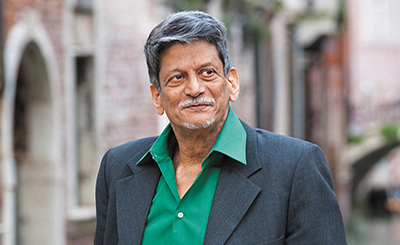
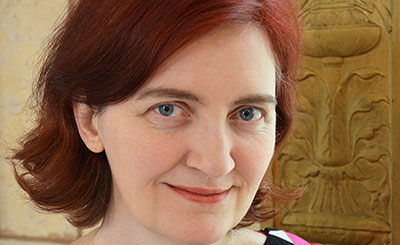

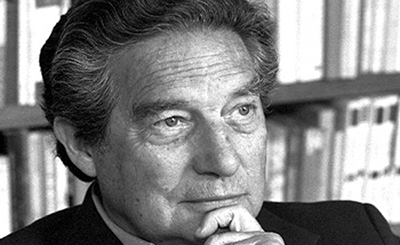

THUMBS.jpg)
